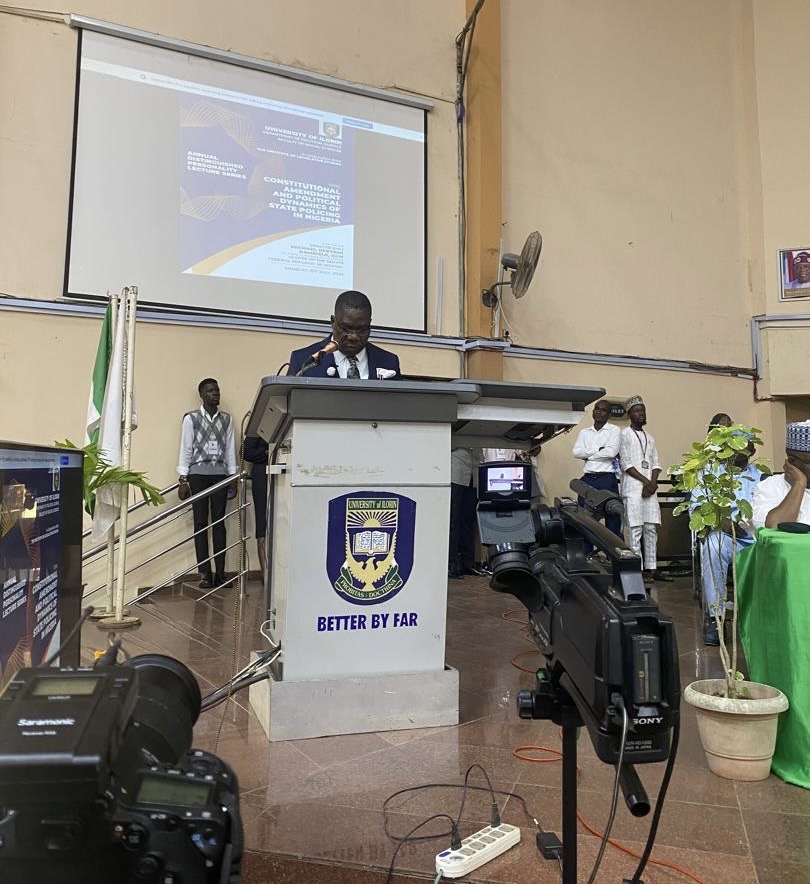By Kayode Abdul
The Leader of the Senate, Senator Opeyemi Bamidele has justified the call for decentralisation of the Police in Nigeria, noting that it would enable the state government to have control over their security affairs.
Bamidele said this while speaking as a guest lecturer at the 2024 Public Lecture on constitutional amendment and the political dynamics of state policing in Nigeria organised by the Department of Political Science in collaboration with the Institute of Legislative Studies, University of Ilorin.
The senate leader, however, states that decentralised police system must come with parameters of checks at the center to prevent abuse of power.
“The foundation of the foregoing controversy over state police is undoubtedly linked to the provision of Section 214 of the 1999 Constitution. The provision imposes the duty of policing the whole country on the federal government. It has been argued that this provision contradicts Nigeria’s practice of federalism.
“It has escalated the security crises in most parts of the country and has more or less usurped the powers of the state governor(s) as chief executive(s) of their respective state(s) as guaranteed under Section 176(2) of the same Constitution.
“This is because ordinarily, the onerous task of maintaining law and order should be the primary responsibility of the state governor as the chief security officer of the state. This, however, has not been the case for governors, who are reduced to ceremonial chief security officers.
The senate leader further stated that effective policing in Nigeria is almost impossible unless there are fundamental changes, highlighted some of the challenges affecting police, including institutional, structural, legal/establishment, operational, financial, environmental, human capacity, historical, leadership, and political. He added that “the numerous problems listed are well known, but simply recruiting more officers will not solve the problems.
“Although, the most commonly conceived argument against the state police is the likelihood of abuse by the state governors, while not disputing the fact that issues of abuse may possibly arise, my position is that the trend of political intimidation and assassinations, which has over time dominated Nigeria’s power play, still prevails in the absence of state police.
“It should consequently not be used as an excuse to discourage the creation of state police in Nigeria, which, when put in place with the right strategy, may prove to be a useful tool for the maintenance of law and order, especially during emergencies.”
He, however, recommends the following as a yardstick for the establishment of state police.
“Establishment of an Independent Service Commission for the police to guarantee police autonomy at federal and state levels in matters of appointment, discipline, promotion, and accountability to operate in the same manner as the National Judicial Council and be insulated from interference by political office holders.
“Permitting cross-service transfer, recruiting based on residential status rather than indegeneship, the annual report should be submitted to the State House of Assembly.
“To reduce incidents of abuse, it is recommended that clear guidelines should be put in place at the center.
“This should include the submission of quarterly reports of the activities of the various state police forces to the central police force and also the establishment of a secured hotline or emergency line where such cases of abuse can be reported, as has been done with respect to gender-based violence offences of whistleblowing in corruption cases.” he said.
Also in his contribution, a Senator representing Kwara Central, Saliu Mustapha commended the host, saying, “This programme is coming at the right time because we are already in the course of a constitutional amendment.
“This would give the people who are in favour and those who are against the chance to express their views, and it would further allow us to have a robust debate on the matter.”
In his remarks, the Vice-Chancellor of the University, Professor Wahab Egbewole lauded the host department for bringing gown and town together, and further made a passionate appeal to the National Assembly for adequate funding of education.
In his welcome address, the acting head of department of Political Science, Dr. Adebola Bakare, said that the department settled on the topic; Constitutional Amendment and the Political Dynamics of State Policing in Nigeria, because of the conflicting trajectory of state policing among levels of Nigerians.
“While some people argue for the establishment of state police to complement the federal policing architecture and adequately cover the nooks and crannies of the country, others are afraid of what will become of the state police in the hands of tyrant governors.
“We intend to use today’s lecture to stimulate further discourse on the subject matter. We plan to organise a two-day roundtable after today’s lecture where stakeholders (security officials, CSOs, farmers, herders, marketers, and the media, among others) will be invited to deliberate on the way forward.”
Cross-section of dignitaries at the event
The dignitaries in attendance include the chairman of the occasion, Senator Barau Jibrin, represented by Senator Lola Ashiru, Senator Sadiq Umar, Senator Abiodun Alli, Hon. Ahmed Aluko, Director General National Institute of Legislative and Democratic Studies, Prof. Sulyman Abubakar and many other important dignitaries.
